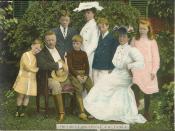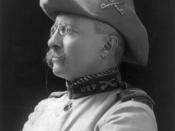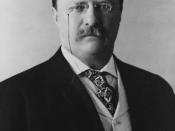In his farewell address, former president George Washington advised his fellow Americans to avoid foreign entanglements. Washington realized that America was still a new and weak country, and that it would take time to become bigger and stronger. To have involved America in foreign conflicts would have put the nation in jeopardy of losing its independence. Americans followed the president's advice for the next 100 years. By 1900, business was prospering; the country had expanded from coast to coast, and needed to look for overseas markets. At the beginning of the 20th centaury, Theodore Roosevelt was one of the leading advocates of "American Imperialism". He believed that in order to become a powerful nation, America needed a strong navy, bases to supply the ships, and colonies to supply raw materials and buy surplus products. In a sense, Roosevelt had greater confidence in American principles than Washington did. Theodore Roosevelt was a go-getter Roosevelt believed that the progress of the country was ongoing.
The greatest service the U.S. could do to promote liberty in the world was to ensure great power peace and the resulting spread of prosperity (Evans 342), and in Theodore Roosevelt's mind, intervention would be the best foreign policy.
In 1901 Theodore Roosevelt, our 26th president, decided that in order to keep the US as a strong naval power he would have to make a quicker rout to go from the east coast of the US to the west coast. So, on November 16, 1901 the United States bought the rights to the Panama Canal for $40 million from France, this was after Colombia tried to blackmail us in paying double the original price which Theodore Roosevelt wanted to hear nothing of, so he promised Colombia its independence if they sold it to America for the original price.


